US House Committee Passes Bill Banning Iran Military Drones
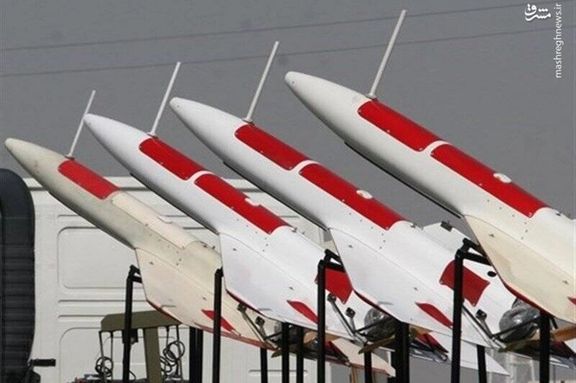
The US House Foreign Affairs Committee Friday passed a bipartisan bill that would ban the supply, sale or transfer of military drones to or from Iran under US law.

The US House Foreign Affairs Committee Friday passed a bipartisan bill that would ban the supply, sale or transfer of military drones to or from Iran under US law.
The bill was introduced by a group of Republicans and Democrats in late November. The lawmakers behind the proposed legislation (H.R. 6089), the Stop Iranian Drones Act (SIDA), say it clarifies that US sanctions on Iran’s conventional weapons program under CAATSA (The Countering America’s Adversaries Through Sanctions Act) include the supply, sale or transfer to or from Iran of drones.
The draft legislation was presented by House Foreign Affairs Committee Chairman Gregory Meeks (D-NY), Michael McCaul (R-TX), Ted Deutch (D-FL), and Joe Wilson (R-SC) Tuesday.
Iran’s military drone program has expanded in recent years and UAV’s have been more frequently used in attacks in recent months both on land and at sea.
In an interview with the Associated Press on Friday, commander of CENTCOM Gen. Kenneth McKenzie expressed concern over the growing capabilities of Iranian missiles and drones.
“Iran’s UAV proliferation continues to threaten the U.S. and our allies throughout the Middle East. Whether the attack is launched by Iran, the Houthis, Iran-backed militia groups or any other Iran-sponsored entities, these attacks are intolerable,” Rep. McCaul said.

Gen. Kenneth McKenzie, US CENTCOM commander has expressed concern in an Associated Press interview over the growing capabilities of Iran’s missiles and drones.
The US general in charge of protecting the Persian Gulf and the wider Middle East said that the range, lethality, capability as well as the quantity of Iranian missiles are increasing and “that concerns me, coupled with their land attack, cruise missiles over the last couple of years,” and with their growing drone program he said.
“You know, they starve their people so they can build these missiles,” the CENTCOM commander said.
Iran’s Islamic government touts its missile and other military programs as sign of its success in self-reliance, but the civilian economy has not grown in the past decade. High inflation, a battered currency and lack of investments have increased poverty.
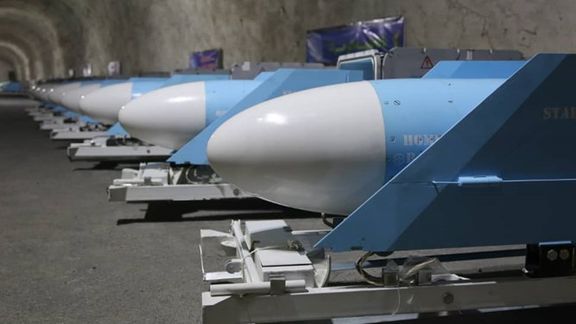
Regarding Iran’s role in Iraq and the presence of around 2,500 US troops, McKenzie said that Tehran and Iraqi militias it backs are upset that they lost in the parliamentary elections in October, and he is anticipating more attacks during December.
"They're really frustrated over their inability to affect government formation in the way they want to do it,” he said and their attacks, including a drone strike at the prime minister’s residence is “a signpost of the desperation that they're under right now.”
Many Iraqis detest Iran’s indirect presence in their country and the political influence Tehran has projected, ensuring that loyal politicians maintain control in Iraq. But at the same time, inefficiencies and the mismanagement of successive governments are also blamed on Iran’s meddling. Large anti-government and anti-Iran protests erupted in October 2019 and continued for months, openly demanding Iran to remove itself from Iraqi politics.
The US general added that Iran’s ultimate aim is to evict American forces from Iraq, but those forces will stay, he reiterated, with a new, non-combat role.
Top Iranian officials have been often claiming that US forces are about to leave Iraq and that would be a second victory after their “escape” from Afghanistan.
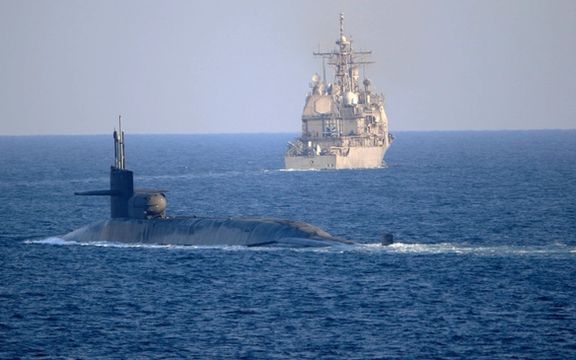
The Chief Editor of hardliner Kayhan daily in Tehran says that closing the Hormuz Strait is the “incontrovertible right” of Iran and “we should not hesitate.”
Hossein Shariatmadari, who is Supreme Leader Ali Khamenei’s representative at the flagship conservative paper wrote the commentary after the United States this week issued a statement reiterating past seizure of Iranian arms destined to Yemen’s Houthis and oil for Venezuela in international waters.
Washington also announced new sanctions on Iranian security officials and entities for human rights violations, including killing protesters and abuse in prisons.
Shariatmadari also said that these US actions coincide with the resumption of nuclear talks in Vienna, and show “the empty-handedness of America and the West” in the negotiations. He added that the United States should know it cannot get concessions from Iran by “empty promises”.
Iran has made similar threats in the past, but the closure of the strait will also chock off Iran's trade amid its current economic crisis.
Iran’s new hardliner negotiating team is demanding all post-2018 American sanctions to be lifted all at once before Iran agrees to revive the 2015 nuclear deal, the JCPOA.
The United States has expressed dismay at Iran’s position and has said that if talks in Vienna do not show Tehran’s seriousness, it is ready to ramp up pressure.
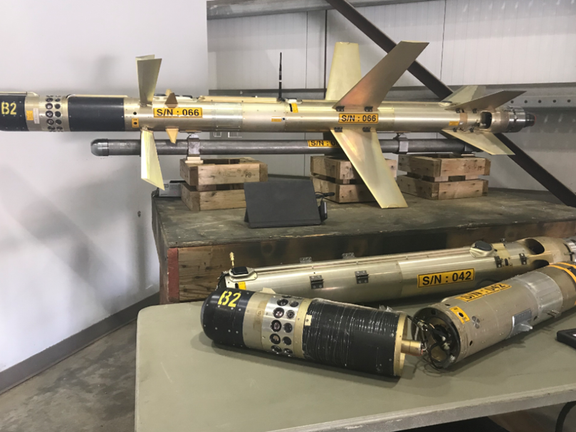
The United States this week has shown little of the ‘good will’ demanded by Tehran over sanctions as deadlocked Vienna talks are set to resume Thursday.
The US Department of Justice (DOJ) issued a press release Tuesday highlighting the US’s “largest-ever forfeitures of fuel and weapons shipments from Iran.” The reason for the timing was unclear. It came the same day as the US Treasury Department designated 15 individuals – nine in Iran, five in Syria, and one in Uganda – for alleged human-rights abuses and as a prelude to a US ‘Summit for Democracy.’
The DOJ press release noted that $26.7 million in “net proceeds” of selling the Iranian oil would be directed in whole or in part to a fund for “US victims of state-sponsored terrorism.”
This followed the DOJ announcing in February the US seizure of 1 million barrels of Iranian oil in 2020. Later news reports said the US had impounded 2 million barrels from just the tanker MT Achilleas, seized in February 2021 off the United Arab Emirates, and sold it in Texas for £110 million, or around $55 a barrel. It was unclear whether the $26.7 million is net of this.
In July, the US brought a court action in a domestic court seeking approval for the previous seizure of four foreign-flagged tankers on the grounds that the sale of the oil would benefit Iran’s Islamic Revolutionary Guard Corps, designated a foreign terrorist organization by the US.
The DOJ last year, when President Donald Trump was in office, had used the procedure of civil forfeiture to sell four Iranian gasoline cargoes bound for Venezuela, seized earlier in the year, for $40 million.
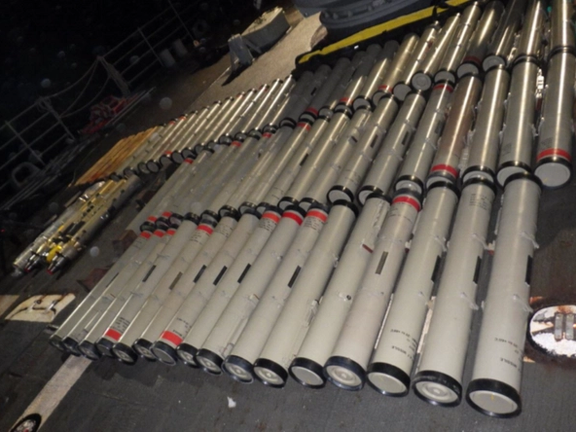
The weapons cited in Tuesday’s press release were taken from “two flagless vessels in the Arabian Sea” in November 2019 and February 2020, including anti-tank missiles and components for land attack and anti-ship cruise missiles. Forfeiture was granted on November 16 by a US court on the grounds that the government had “adequately alleged that the weapons belonged to the IRGC and that the IRGC constituted an entity engaged in planning or perpetrating a federal crime of terrorism against the United States.”
‘Pallets of currency’
In what will be seen as further sign of US toughening in Tehran, the National Defense Authorization Act, passed Tuesday by the House of Representatives, reportedly included several clauses on Iran.
With the agreed text not yet available digitally, Gabriel Naronha, who worked on Iran in the State Department under Trump, tweeted Tuesday that at least some of draft clauses covering Iran had been passed.
One barred the Defense Department from the “transfer of pallets of currency, currency, or other items of value to the Government of Iran, any subsidiary of such Government, or any agent or instrumentality of Iran.” This was apparently intended by drafters to preclude any US move, as was done under the Obama administration when the 2015 nuclear deal was agreed, to repatriate Iranian assets frozen in the US in exchange for the release of Americans detained by Iran.
Naronha tweeted “deep condolences” to John Kerry, Secretary of State at the time of the 2015 deal, the JCPOA (Joint Comprehensive Plan of Action). In an interview on Iranian state television Sunday marking 100 days in office, Iranian president Ebrahim Raisi said Tehran was prepared to scale back its nuclear program to JCPOA limits on condition that the US lifted sanctions imposed since 2018 when Trump left the agreement.
Iran has adopted a tough negotiating posture in Vienna after Raisi’s election, demanding that all post-2018 sanctions be lifted at one and prior to Iran making concessions. US and its European allies have criticized the new demands saying that Tehran has reneded on agreement made during the talks from April to June.
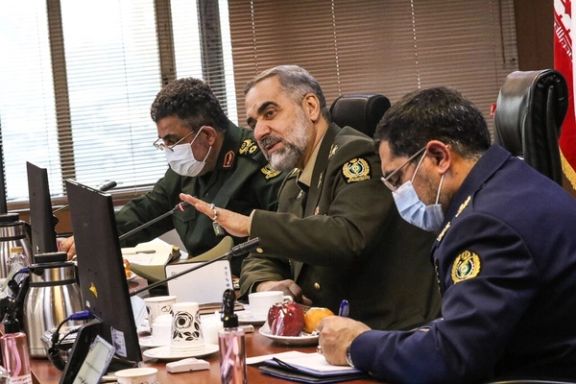
Iran’s defense minister visiting Aerospace Industries Organization (AIO) praised its efforts in boosting the military capabilities by supporting the air force.
General Mohammad-Reza Gharaei Ashtiani said the defense ministry’s role is strengthening strategic industries and production to provide hardware to the armed forces. He was speaking to the senior management of the AIO, which is officially a state organization to develop civil aviation.
He stressed the importance of setting priorities in the quest to become self-sufficient in industry and military capabilities.
Iran has been under various kinds of arms embargoes, including a UN Security Council embargo that ended in October 2020, since the inception of the Islamic Republic in 1979. But it has managed to develop a strong missile force and lately lethal drones that have led to concerns in the region and in the West.
Deputy Defense Minister General Seyed Mehdi Farahi also spoke at the event, emphasizing that 280 private companies in Iran are involved in aviation industry. He added that this potential could satisfy the needs of the armed forces in terms of quality, quantity and price of hardware.
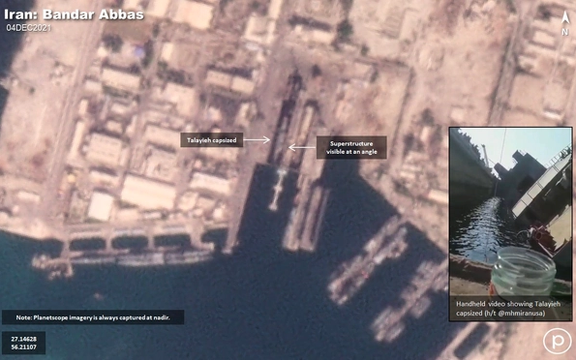
An Iranian naval vessel which was under construction at Bandar Abbas in southern Iran has capsized in dry dock, killing one Navy personnel.
Footages and satellite photos have been shared on social media since Saturday, confirming that the doomed vessel, named Talaiyeh, has capsized.
In one footage, people are seen hanging onto railings along the side of the ship tipped upwards.
Iranian authorities have not yet commented on the reports, and the reason for the incident and its exact date remain unknown.
This is at least the fourth incident involving the Iranian Navy in recent years.
In June, the large Iranian navy ship Kharg sank after catching fire in the Gulf of Oman during a training mission,
In May 2020, the Iranian Navy vessel “Konarak” was accidentally shot and sank by another Navy frigate “Jamaran” during a military exercise, killing 19 crew members and injuring 15 others.
Her sister-ship Damavand had also sunk in a navigation error on January 10, 2018.